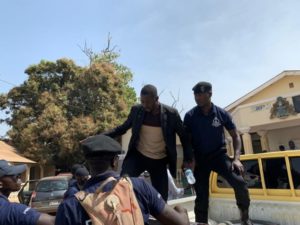 Eight executive members of the Operation 3 Years Jotna (3YJ) were on Wednesday afternoon arraigned before Magistrate P. Sarr of the Kanifing Magistrate’s Court.
Eight executive members of the Operation 3 Years Jotna (3YJ) were on Wednesday afternoon arraigned before Magistrate P. Sarr of the Kanifing Magistrate’s Court.
At least 137 were initially arrested but only eight (senior executive members) have been dragged to court in the meantime. Police prosecutors have filed three-count charges against the accused persons.
On Count One, the accused persons are charged with unlawful Assembly, contrary to Section 70 of the Criminal Code, Cap 10:01 Vol. III, Laws of The Gambia 2009.
According to the particulars of offence, the accused persons; Abdou Njie, Ebrima Kitim Jarjue, Sheriffo Sonko, Hagi Suwaneh, Fanta Mballow, Karim Touray, Yankuba Darboe and Muctarr Ceesay, on or about the 26th January 2020, at Sting Corner and diverse places around Old Jeshwang in the Kanifing Municipality of the Gambia, jointly and unlawfully took part in an unlawful assembly, thereby committed an offence.
On Count Two, the accused persons are charged with rioting after proclamation, contrary to Section 74 of the Criminal Code, Cap 10:01 Vol. III, Laws of The Gambia 2009.
According to the particulars of offence, the accused persons; Abdou Njie, Ebrima Kitim Jarjue, Sheriffo Sonko, Hagi Suwaneh, Fanta Mballow, Karim Touray, Yankuba Darboe and Muctarr Ceesay, on or about the 26th January 2020, at Sting Corner and diverse places around Old Jeshwang in the Kanifing Municipality of the Gambia, after the expiration of the proclamation made by the Deputy Superintendent of Police Alagie Jallow in the name of the President of the Republic to disperse peacefully, the accused persons disregard such a proclamation and continued to be so assembled riotously; thereby committed an offence.
On Count Three, the accused persons are charged with rioters demolishing structures, contrary to Section 76 of the Criminal Code, Cap 10:01 Vol. III, Laws of The Gambia 2009.
According to the particulars of offence, the accused persons; Abdou Njie, Ebrima Kitim Jarjue, Sheriffo Sonko, Hagi Suwaneh, Fanta Mballow, Karim Touray, Yankuba Darboe and Muctarr Ceesay, on or about the 26th January 2020, at Sting Corner and diverse places around Old Jeshwang in the Kanifing Municipality of the Gambia, being riotously assembled together, unlawfully destroyed the Gambia Technical Training Institute (GTTI) Students Waiting shed by setting it on fire, thereby committed an offence.

When the case was called, Superintendent Mballow announced his representation for the IGP alongside with ASP Almameh James Manga.
The accused persons were represented by a team of defence counsel comprising Lawyer Lamin S. Camara, Lamin J. Darboe, Lamin L. Darboe, Borry S. Touray, Abdoulie A.M.O. Badjie, Ebrima K. Jallow and Abdoulie Jarju.
In his submission, Superintendent M.D Mballow made an application for the matter to be transferred to the High Court because the lower court lacks the jurisdiction to try count 3 which deals with rioters demolishing structures.
Superintendent Mballow submitted that counts 1 and 2 attract imprisonment of 1 and 5 years respectively while count 3 attracts life imprisonment.
“Our laws do not confer this court with the power to try offences that attract a life imprisonment,” he said.
The lead defence counsel Lawyer Lamin S. Camara, responded to the prosecution’s submission and said: “I like the argument of my learned friend. Yes, the court lacks the jurisdiction to hear the case. So why do you bring us here? I applaud the argument of my learned friend, but I bet to disagree with him.”
Lawyer Camara said: “This court has the jurisdiction to try this case. This court has all the powers under section 5 (2) of the Criminal Procedure Code (CPC) (powers of the subordinate courts).”
He said section 5 (2) of the CPC provides that the court can sentence any offence authorised by law.
The senior lawyer submitted that Legal Notice number 3 of 2009 is not a law but a practice directive. He argued that the legal notice is not an Act of the National, not a rule and not a regulation but a practice directive creating a Division of a court.
“The legal notice does not oust the court’s jurisdiction to try the offences. The intent of the practice directive (Legal Notice) is contained in section 1. It provides ‘in the interest of effective case management and expeditious disposition of cases relating capital offences,” Camara said.
He said the legal notice does not create a court instead it created a Special Division of a court, therefore, it cannot take away jurisdiction. Lawyer Camara argued that the legal notice provided for capital offences.
“Capital offences attract death and not life imprisonment,” Camara said, adding that “death, death and not life imprisonment.”
He said the court has the jurisdiction to grant the accused person bail on all the 3 counts even though the 3rd count attracts life imprisonment relying on Section 29 of the Criminal Code. He added that the discretion of the court to hand down judgment prescribed by law is not fettered.
“Sentence to life imprisonment is not mandatory under our laws, unlike treason which attracts death. The court can reduce sentences including life imprisonment sentences,” Lawyer Camara said.
Lawyer Camara said section 208 A of the CPC does not make it mandatory for the court to transfer the matter to the high court. He said the said section has the word “may” which means it is not mandatory to transfer matters adding that the court has the jurisdiction to try the case.

Supt. Mballow, in his reply on points of law, said Section 5 of the CPC provides that the court shall not derogate from the law that confers jurisdiction to another court.
He said Legal Notice number 3 of 2009 is a law envisaged and recognised by section 7 of the Constitution. He said section 27 of the CC deals with punishment and it has no bearing in the argument.
“This court cannot deal with an offence that it does not have jurisdiction to try,” he stated.
He added: “capital offence does not exclude offences that attract life imprisonment. Capital offence includes life imprisonment.”
Magistrate P. Sarr of the Kanifing Magistrate’s Court made this ruling following an intense argument between the prosecuting officer and the defence lawyer.
In her ruling, Magistrate Sarr said the Legal Notice is a law and it has ousted the jurisdiction of the court to try the case. She said the Legal Notice is a subsidiary legislation and therefore Section 7 of the Constitution provides that subsidiary legislation forms part of the laws of the Gambia. She said she lacks the jurisdiction to entertain the matter.
She transferred the matter to the High Court in reliant on Section 61 of the Criminal Code. She also relied on Section 208A to remand the accused persons to Mile II pending the Special Criminal Court hearing.
Source: Kexx Sanneh
Written by The Digest. Additional reporting by Kexx Sanneh.

